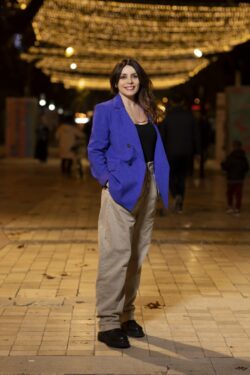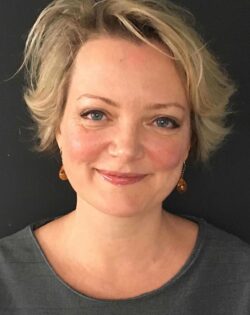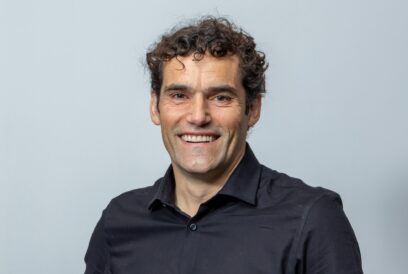

Photo: Shutterstock
Photo: Shutterstock
People around the world are increasingly being exposed to the deliberate spreading of disinformation. Therefore, the need for critical media literacy is growing. Fact-checkers and journalists are taking an active role in this area. Let’s hear the experiences of fact-checkers from Albania, Belgium and Finland.
Klodiana Kapo, Albania
“In journalism, fact-checking and media literacy go hand in hand. The most effective way to approach media literacy and critical thinking is through pre-bunking, a form of inoculation against disinformation. It is more effective to tackle disinformation ex-ante and warn people before it reaches them.
At the same time, we need to offer journalists, students and the general public activities that increase their capacity to face this problem.
Faktoje.al offers activities that enhance the capacity for spotting disinformation and mastering fact-checking tools, including awareness campaigns and how-to-tackle-disinformation videos. We also train journalism students, journalists and interns in fact-checking.
Misinformation and disinformation are constantly taking new forms in the digital world. In Albania, most disinformation comes from the government, so our daily work includes debunking misinformation and fact-checking declarations and electoral promises. Social media is also bombarded with fake news.
In 2022, an Iranian-aligned hacker group called Homeland Justice attacked Albania’s governmental information systems. Since similar attacks have taken place in other countries, co-operation and communication with other fact-checking organisations is needed. Strengthening regional and international networks has been an effective way of fighting disinformation and foreign influence.
It is more effective to tackle disinformation ex-ante and warn people before it reaches them.
Because of advanced technology, Albanians get their news from social media. Hence, traditional media is refocusing its attention on this medium. Technology has also made it possible for portals and various individuals, often with no professional training, to call themselves media and spread unverified or false information.

Social networks transmit hundreds of news items that risk creating a distorted perception of issues of public interest, which may endanger public health, order and security. Therefore, social media should also transmit consistent campaigns aimed at media consumers to avoid falling for disinformation or clickbait.
Promoting fact-checking journalism and fact-checking services is essential to make the audience understand why fact verification is important and how it relates to everyone’s life. The public should also become engaged themselves, by reporting and verifying issues that affect their and their communities’ interests.
To make this happen, media, schools, the government, NGOs and communities need to work together.”
Klodiana Kapo
- works as Executive Director of Faktoje.al, the first fact-checking site in Albania, which started operating in 2017
- has worked as a journalist for Top Channel and as Editor-in-Chief for the Albanian Public Broadcaster where she has reported on social issues
- has also experience in PR and Communication having worked for World Vision
- has run a serie of successful awareness campaigns for non-governmental organisations, both local and international
Juliane von Reppert-Bismarck, Belgium
“Lie Detectors counters the corrosive effect of disinformation by teaching children to take a critical approach to the content they find online. We encourage them to apply basic journalistic methods to separate false, manipulative and polarising content from honest reporting.
The children learn how to do this with the help of classroom visits by our growing community of more than 250 journalists. We are also training teachers directly so that they can share the same skillset with their pupils.
The most crucial takeaway from our work is to show the difference between, on the one hand, deliberately manipulative content and, on the other, journalistic content that may honestly not always be error-free but is created with the bona fide intention of informing the public.
Disinformation may evade detection in encrypted spaces and in image- and video-based platforms like Instagram, YouTube and TikTok. However, children are targeted on these channels, and very often they are navigating in these channels alone.
It is important that teachers be aware of this and understand just how unsupervised children may be in these information worlds – not so that they should warn children off mobile phone use, but just to make them aware of the context of wide adult-child gaps while discussing online information with children.
Our aim is never to tell children what to think, but rather embed a sense that it’s worth stopping and pausing to think.
For this, we always work with the children in the presence of their teacher. The teachers often ask for more information and materials.

Photo: Lie Detectors
Journalists employ an enquiring mind every workday, and they are well suited to passing on this curiosity to children – until teachers are ready to transmit these skills themselves. Our aim is never to tell children what to think, but rather embed a sense that it’s worth stopping and pausing to think in the fast-paced world of information.
Our vision is for all school curricula to include critical media literacy, and that this literacy be recognised as a core literacy, alongside reading, writing and arithmetic. Once this is reflected at OECD-, UNESCO-, regional- and local level, our job will be done.”
Juliane von Reppert-Bismarck
- founder and CEO of Lie Detectors
- has advised governments, policy-makers and the EU on strategies to counter disinformation and radicalisation, including within the EU’s High-Level Expert Group on Fake News and its Media Literacy Expert Group
Lie Detectors is active in six countries across Europe – Austria, Belgium, Germany, Luxembourg, Poland and Switzerland. In 2022, its journalists made more than 1,300 classroom visits and reached tens of thousands of pupils.
Kari Kivinen, Finland
“I initially became interested in media literacy and fact-checking via my work as the headmaster of school with all the levels from nursery to upper secondary. We were looking for practical, hands-on material on media literacy education for children, and couldn’t really find any.
That’s when I started working with Faktabaari, a Finnish fact-checking organisation, and we started to adapt its fact-checking methods and materials to the school environment as part of our teaching.
The aim has been to develop “pedagogical fact-checking”. We show students tangible tools and tactics for fact-checking, but also talk about the various agendas behind misleading information, the role of platforms, the impact of algorithms and different forms of manipulation. The challenges of misinformation are complex, and I think education needs to reflect this.
The challenges of misinformation are complex, and I think education needs to reflect this.
Digitalisation has created a whole new world of both opportunities and threats, and it’s difficult to keep up with all the changes. We understood straight away that it was not only the kids who needed more education on digital information literacy, but also – and perhaps particularly – the adults.
First we started training teachers, and then expanded to other demographics as well. For example, I’ve run workshops on “digital self-defence” courses specifically designed for older people, with the focus on safe and responsible use of digital services and platforms.
At Faktabaari, we hope to spark more discussion around the impacts of digitalisation on democracy. Parliamentary elections took place in Finland in April 2023, and that meant a spike in misinformation campaigns, information warfare and aggressive, micro–targeted advertising on digital platforms. We are currently working on pedagogical materials on “digital voter literacy”, hoping to provide people with more understanding of how to be aware of these different information influencing tactics and their effectiveness.

Photo: Kari Kivinen
Another thing I wish was talked about more is conspiracy theories. People falling deep into the world of such theories is an important societal issue, as recovery can be very difficult. I believe we need to learn more about supporting the victims of conspiracy theories and their families.”
Kari Kivinen, PhD
- started as the Education Outreach Expert of the EUIPO OBSERVATORY in the beginning of October 2020
- is also a member of EU Expert Group on Tackling Disinformation & Promoting Digital Literacy
- leads the pedagogical development work at Faktabaari EDU in Finland
- has co-authored and piloted learning materials with fellow teachers around Finland and abroad, including the Digital Information Literacy Guide published in 2022
Author







